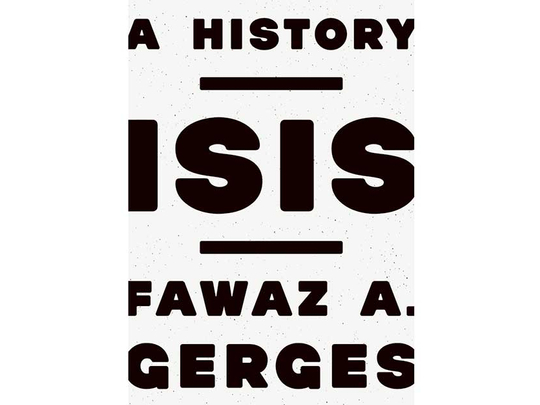
ISIS: A History
By Fawaz A. Gerges, Princeton University Press, 384 pages, $20
In his latest book “ISIS: A history”, Professor Fawaz Gerges tries to fill the gaps in the picture of the most recent, most savage and most feared group now controlling swaths of land in Syria and Iraq while gaining allegiance from similar groups in the Middle East, Africa and Asia.
The main objective of the book is to put Daesh (the self-proclaimed Islamic State of Iraq and the Levant) in context, looking into socio-political developments accompanying the rise of Daesh and how it overtook Al Qaida Central in heading Global Jihad or Salafi-Jihadism. Gerges outlines one of the main differences between Daesh and Al Qaida: “One of the defining features of ISIS’s [Daesh’s] strategy that contrasts with that of Al Qaida Central is that it, along with its predecessor, Al Qaida in Iraq (AQI), has so far consistently focused on the Shia [Shiite] and the ‘near enemy’ of the Iraqi and Syrian regimes and their Persian ally, rather than the ‘far enemy’ of the United States, Israel, or other global actors.”
Gerges is a well-known writer on “political Islam”, and has published interesting books and academic articles on the subject. Though you might not agree with his analysis all the time, you’d always value the quality of his work.
According to the book, “If the chaos in both Iraq and Syria provided ISIS with a fertile ground to implant, expand, and consolidate itself, the failure of Arab states to represent the interests of their citizens and to construct an inclusive national identity strong enough to generate social cohesion also contributed to its growth.”
Though the failure of Arab states might not be much argued, its input in creating Daesh could be disputable. Militancy of “political Islam” has existed since early last century, even before the post-independence state emerged in the region.
The initial chapters are a concise account of the rise of Daesh from broken Iraqi politics, especially during Nouri Al Maliki’s rule and his divisive policies. The chapter on Abu Bakr Al Baghdadi sheds light on the man leading the brutal group. It then goes on to explain how Daesh competed with the Al Nusra Front in Syria (an Al Qaida affiliate group) and the struggle between Al Baghdadi and Abu Mohammad Al Joulani (of Al Nusra Front).
The last chapter is mainly about a “split” in Salafi-Jihadism, which might not be the case if you come from a different approach than Gerges’s. Challenging the basic notions forwarded by Gerges, John Esposito and others is a view that looks at various militant and terrorist groups as the evolution of the same basic ideology adopted by the Muslim Brotherhood (MB) — the root of that brutal phenomenon based on involving religion in politics in the first place. The latter argument refutes “political Islam” as a force of positive change in a region of stagnant politics.
That might be more clear in Chapter 7, in which the author subtly implies that the failure of MB in Egypt and Tunisia helped radicals in Iraq and Syria morph into Daesh. “Finally, ISIS could not have surged without the derailment of the Arab Spring uprisings and the sabotage of the aspirations of millions of citizens who called for a more just social contract and a bill of rights,” Gerges writes.
That would be fine as long as it was not extended to the next argument — the idea of a “split” between “moderate” and “hardliner” forms of political Islam. But the book does that: “Jihadist leaders from various factions have all savagely criticised mainstream Islamists, mainly the Ikhwan [Muslim Brotherhood] in Egypt and Al Nahda in Tunisia, for playing by the rules of the democratic game and for participating in elections and joining parliaments ... According to [Al] Baghdadi, [Al] Joulani, [Ayman Al] Zawahiri and Abu Qatada, political change could only come about through the barrel of a gun, not through the electoral box.”
Unfortunately, it’s the same notion used in politics by the Americans and the West in general when they classify terrorist groups in Syria into “moderate” (such as Ahrar Al Sham, the military arm of Ikhwan) and “hardliner” (such as Daesh). The book does not take that line in any way, yet the approach of degrees of militancy is the basis on which the West insists on installing Ikhwan in the Libyan government, though electorates ousted them from power.
Gerges writes: “For the moment, ISIS is ascendant. As this book has argued, the organisation is both a symptom of the breakdown of state institutions in the heart of the Arab world and a clash of identities between Sunni and Shiite Muslims. This two-pronged social and sectarian crisis has allowed ISIS to step forward and fill a governance void, depicting itself as the sole defender of aggrieved Sunnis.”
On what needs to be done to combat Daesh, it suggests many fronts. One of it is economic: “ISIS’s umbilical cord is tied to raging civil wars in Iraq, Syria, Libya, Yemen and beyond and the criminalised war economy that has emerged a result. This war economy enables the group to act as a protostate and to gain the acquiescence of poor local communities.” So you need a multi-pronged approach to combat Daesh: political reform, cutting its financial lifeline, and of course, military.
He concludes: “The most effective way to delegitimise ISIS depends on the ability of Arab societies, together with the regional and great powers, to politically resolve spiralling communal conflicts and to support state-building structures along transparent and legitimate lines.
“In addition, there is an urgent need to resolve the Israel-Palestine conflict, which has provided ideological nourishment to nonstate actors, including Salafi-Jihadists. The prolonged tragedy of the Palestinians is a constant source of motivation and recruitment for Al Qaida groups of all varieties, including ISIS.”
Dr Ahmad Mustafa is a writer based in Abu Dhabi.









